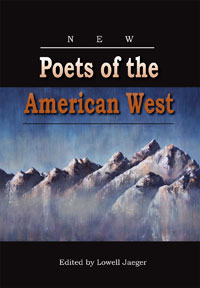Lowell Jaeger sat in the back row of his eighth grade English class, “scribbling bawdy parodies to Beatles lyrics,” as he described it, when one day the instructor caught him.
“My face flushed and my heart raced as she lifted my notebook,” he wrote in the introduction to an expansive, recently published anthology of Western poetry he edited. “I was certain she’d read aloud what I’d written and humiliate me.”
But instead, the teacher, Bernadine Tomasik, returned his notebook, looked him in the eye, and said, “Mmmm. A budding poet.”
“She lifted me up, rather than put me down,” Jaeger wrote. “I showed her everything I wrote from then on.”
Decades later, Jaeger, who has taught creative writing at Flathead Valley Community College for more than 25 years, does what Tomasik did for him to students in Northwest Montana: lifting them up, and showing how poetry can serve as a way to embrace, and confront, the world.
“My dad was a mill worker and I came from a blue collar background,” Jaeger said last week during an interview in his office. “I like the idea of turning people onto learning and onto books, because the people who did that to me just did me the biggest favor.”
Kathy Hughes, vice president of instruction at FVCC, said evaluations of Jaeger’s teaching consistently strike the same chords: “Students had no idea that they could write poetry, then they find that they can, and how meaningful that’s been for them.”
Jaeger is among several faculty members who taught at the college back when it lacked a campus and was located in downtown Kalispell. Its subsequent expansion has allowed students to access a broad range of interests, from goldsmithing to learning journalism writing for the “Mercury” campus newspaper, of which he is the adviser.
 |
|
|
“It’s still a great place for people to start because there are just so many ways that they can find out who they are by trying different things,” Jaeger said. “I’m almost 60 years old and I don’t plan to retire for another 10 years – I love my job.”
In February, Jaeger will be one of six Montanans to receive the Governor’s Humanities Award for his teaching and his editing of several collections of regional poetry, the most recent of which, “New Poets of the American West,” assembles the work of more than 250 poets from 11 Western states writing in multiple languages. It is dedicated to Tomasik.
Jaeger described the collection, culled from 12,000 poems submitted, as “a psychic and cultural snapshot of who these people are, by what it is they’re writing about.”
“I wanted poems that showed nitty-gritty realities of life in the West and all the varieties of what it is to live in these 11 states,” he added.
Jaeger is also a recipient of the award due to his work leading “Meaning of Service,” a program where he hikes into remote locations to meet with trail crews from organizations like the Montana Conservation Corp. to discuss, as he put it, “this intersection between civic duty and civic discourse.”
“When did we lose the ability to talk to one another about important issues? Why can’t we be civil about it anymore?” Jaeger said. “We’re hoping, again through the humanities, to get back to a place where we can talk about important issues without shouting at one another.”
He finds poems ideal tools for grappling with these questions in that they allow readers to reach their own conclusions on a given topic.
“There’s a lot of ambiguity in poetry, it’s not preaching or teaching,” Jaeger said. “It just gives you a picture of where things are.”
He cites the well-known poem, “Mending Wall,” by Robert Frost, in which the author and his neighbor rebuild a stone wall that divides their property, as an example of a way to explore notions of whether such borders are helpful in human relations.
“Are there walls between people that need to come down?” Jaeger said. “Are there walls that need to stay there?”
Much has been written about the diminished role the study of the humanities plays at American learning institutions. Humanities departments are shrinking as fewer students see the value of, say, studying British literature as a path to a career in an increasingly competitive job market. Jaeger readily acknowledges what he called “a real drift of education toward employment,” but he doesn’t despair.
“That’s really understandable, especially at a community college,” he said. “But it’s my job, in a sense, to keep reminding people that there’s more to education than that.” Jaeger believes the humanities can show students, “how to appreciate the culture you’re in, and just how to understand other people.”
“Poetry becomes that sort of perfect vehicle,” he added.
A graduate of the Iowa Writers Workshop, Jaeger this year published his fourth collection of poems, “We.” The title, he said, is taken from the phrase, “We the People,” and its poems are a series of sketches: of neighbors, high school kids, sewage workers, stroke victims.
“I’m a poet of people; I don’t think there are many poems I’ve ever written that don’t have people in them,” Jaeger said. “I love the variations and possibilities of human life.”
Many of his observations are of everyday scenes. The image of a shirtless man with a beer gut spraying teenagers with a garden hose might not seem like poetic material, but in Jaeger’s rendering it is joyous. And while the subjects certainly aren’t simple, nor are the poems in “We” difficult to access, his verse is clear, spare and direct: poetry distilled from the speech of Montanans and other Western Americans.
“I love language from real people; I love listening to how people talk,” Jaeger said. “People speak poetry every day.”